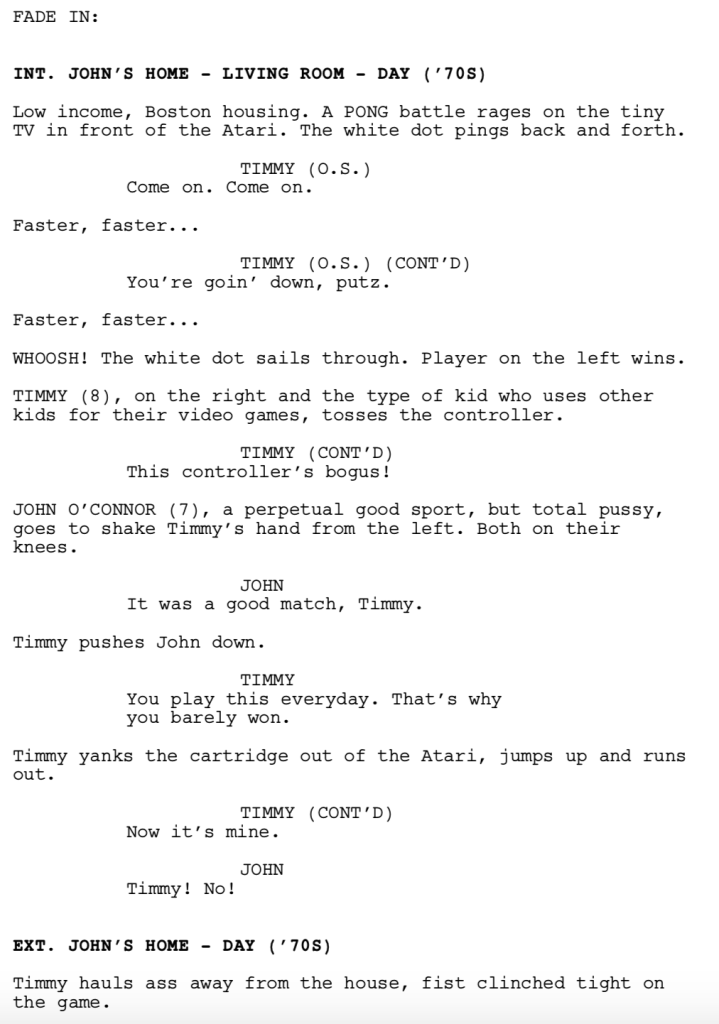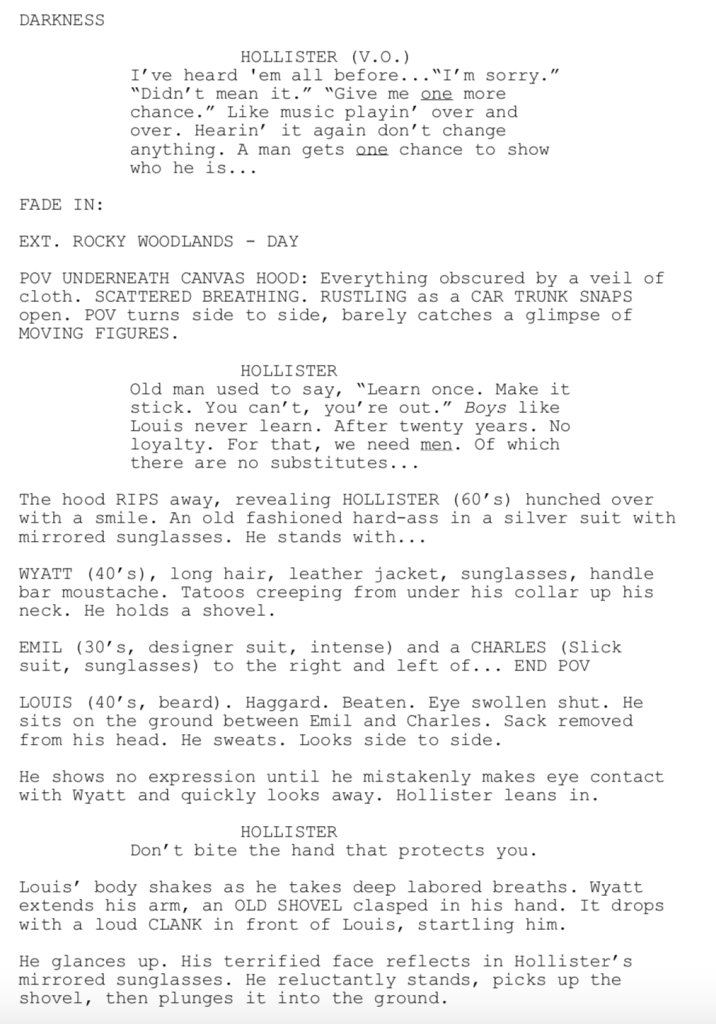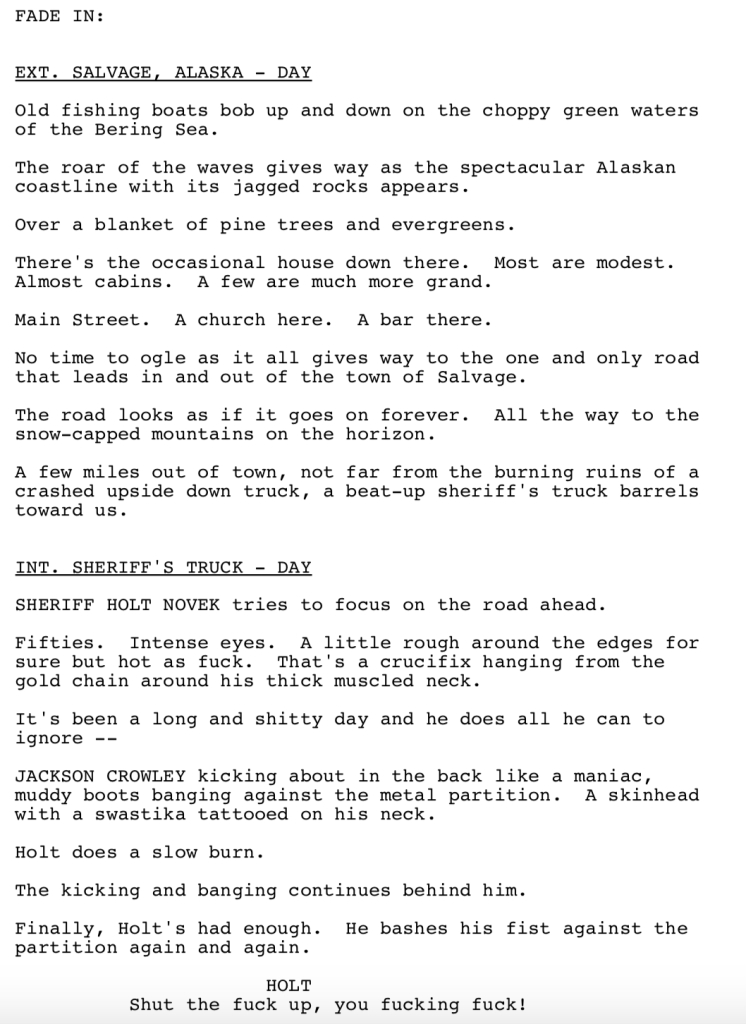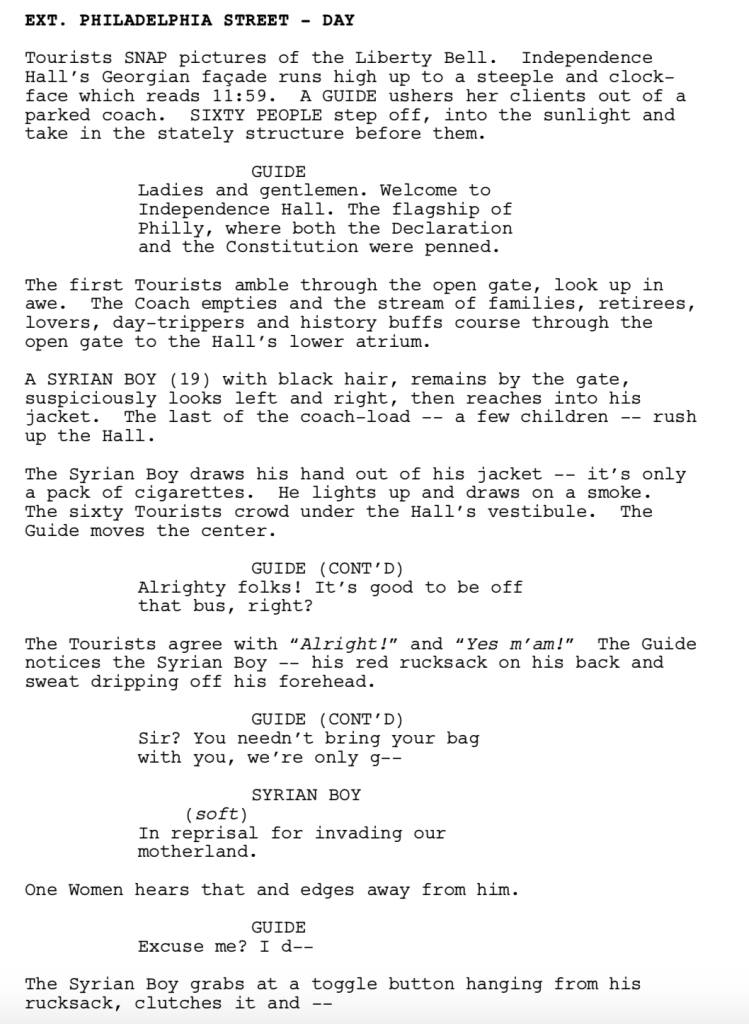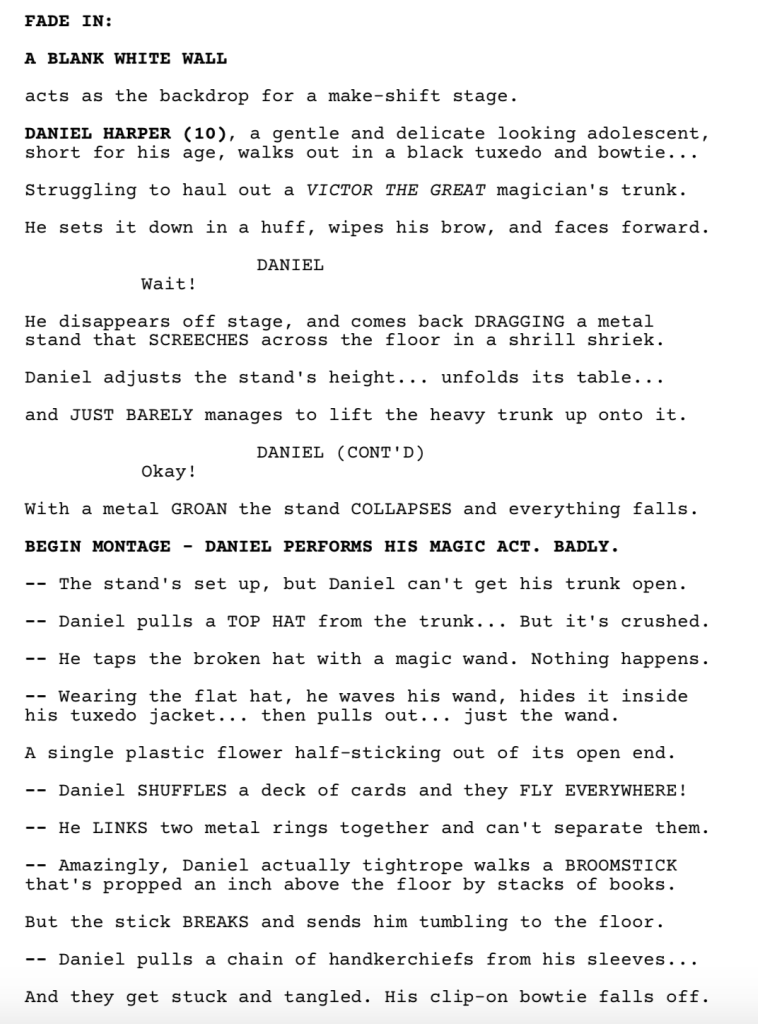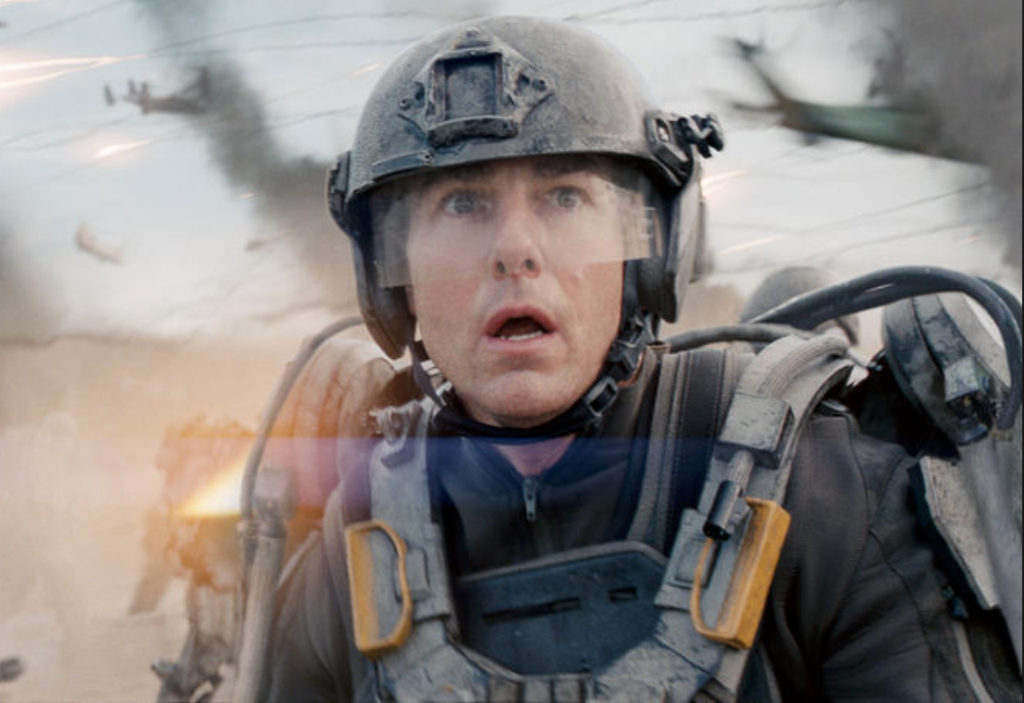It’s going to be a loooooonnnnnng weekend. No Scriptshadow til Tuesday (Monday is a holiday here in the U.S.). But the good news is when I come back, I’ll be reviewing the book that just became the hottest project in town. I’m a quarter of the way through it, and the writing isn’t great. But both the main character and story are awesome. A reminder that you don’t have to be the best writer to break in. But you do have to be a good storyteller. That means crafting clever suspenseful plots with unique flawed characters. The hero in this story is about as flawed as they get. To be continued…
If you haven’t played Amateur Offerings before, read as many of this weekend’s scripts as you can and VOTE for your favorite in the comments section. Voting closes on Monday, September 3rd, 11:59pm Pacific Time. Winner gets a review next Friday. — If you’d like to submit your own script to compete in Amateur Offerings, send a PDF of your script to carsonreeves3@gmail.com with the title, genre, logline, and why you think your script should get a shot.
Title: Parking Enforcement
Genre: Buddy Comedy
Logline: When two forty year-old parking enforcement brothers uncover a Boston police department conspiracy, they must devise a way to take down the very people who control their shot at a badge. (Step Brothers meets 21 Jump Street)
Why You Should Read: Structure is always a great conversation in screenwriting and this remains my most outlined script to-date, so I’d love to see how that comes across to readers. I fell in love with this concept of Parking Enforcement, but in a Jonah Hill / Will Ferrell style comedy. Would anything that happens in this script happen in real life? Other than the cops being crooked? Not likely. But, I also wanted to make the central core of the script universally relatable — people who feel they are better than where they are and always striving to get to that place, no matter the label that is given to them by others. This is a goofball script meant for big laughs, but also with big heart, so I’d love to see if it resonates with the audience.
Title: The Janitor
Genre: Crime/Drama
Logline: A mob rib breaker turned high school janitor seeks to redeem his violent past by preventing a young girl from making the same mistakes he did, but when drugs and gangs overrun her school, he must risk his cover to clean it up.
Why You Should Read: Writing is the reason I get up in the morning. I have been a Nicholl Fellowship quarterfinalist multiple times, a Page semi-finalist and was the 2016 winner of Screamfest with my screenplay “Plum Island”. My day job working with troubled youths allows a consistent reservoir of unique experiences that I draw upon when creating realistic and fleshed out characters. Why read? “The Janitor” perfectly portrays human complexities in a gritty urban setting and creates cinematic characters that are both mythic and believable.
Title: Salvage
Genre: Horror
Logline: As a remote Alaskan town prepares for winter, a young woman from out of town is brutally killed at the motel, and the sheriff – still obsessed with the unsolved murder of his daughter six months earlier – embarks on an investigation that turns many in this tight knit community against him and leads him to suspect the woman’s death may be connected to his little girl’s tragic slaying.
Why You Should Read: I studied screenwriting at Writers Boot Camp and Hofstra University and have worked in the industry as a script reader, production assistant, casting assistant and agency assistant in between writing scripts which garnered me three agents over the years, two options, and actor attachments from the likes of Armand Assante and Eric Roberts. Alas, no actual sales yet. Salvage is my personal favorite, the original draft of which was largely written while heavily medicated following surgery.
Title: THE OPERATIVES
Genre: Action Spy Thriller
Logline: When a global terror plot is exposed, five top agents (from Russia’s FSB, Israel’s Mossad, China’s MSS, Britain’s MI6 and America’s CIA) are forced to work together to stop the threat.
Why You Should Read: I’m a screenwriter in Sydney and love writing true stories and thrillers. I took and stunt-driving course, started on my helicopter license, and boxing lessons. Learning to know what I write, rather writing what I know. THE OPERATIVES takes the locomotive intensity of Bourne and Bond, and creates a 5-man-band in the vein of Mission Impossible, Suicide Squad and The A-Team.
Title: Inky Magicat & The Lonely Magicians
Genre: Family Comedy
Logline: When the world’s greatest magician loses the magic talking cat that makes his tricks work, the timid boy who rescues her tries to reunite the cat with her family before their careers are ruined.
Why You Should Read: Inky Magicat is a never-ending joy ride featuring a wide array of likable and entertaining characters. With solid goals, stakes, urgency, and a strong dose of comedy sprinkled with grounded sequences of emotion inducing drama, Inky Magicat touches on themes of how crime doesn’t pay, and features a relatable coming of age arc to be enjoyed by people in all walks of life. Billed as PADDINGTON meets THE PRESTIGE, Inky Magicat is a four quadrant comedy suitable for international audiences, and we believe it has the potential to become a strong family movie franchise.
One of the more frustrating things about screenwriting, or any artistic endeavor for that matter, is feeling like you’re so far away from the prize. You may live 10,000 miles away from Hollywood or be knee-deep in a screenplay you’ve run out of ideas for. Meanwhile, to waste time, you visit the trade sites, which bombard you with deal after deal being made by established and newbie writers alike. It creates the illusion that everybody in the world is succeeding except for you. And it’s in these moments that you ask yourself if it’s all worth it. Should you even bother trying?
Part of the problem is that writing is a solitary pursuit. You’re in your head a lot. You’re constantly going to negative places. So if you want to convince yourself that breaking into the industry is impossible, it doesn’t take a whole lot of googling to do so. There are plenty of articles to read with created-out-of-thin-air statistics (“Only 1 in every 100,000 screenplays gets produced!”) to support your Impossible To Succeed Theory.
Screenwriting is like any other pursuit. If you want to break through the studio gates, you need a plan. The more structured the plan, the more likely you are to succeed. I’ll never forget reading how Vin Diesel broke into acting. He was working as a bouncer at a club where the nightly conversation was about making sure you bought that week’s lottery ticket. It was so depressing. So Diesel put a plan to together. He would write, direct, and star in a short film that highlighted the kind of actor he wanted to be, he’d submit to Sundance, industry people would see it, they’d cast him in movies, he’d move to Hollywood, and his career would begin. What followed? Diesel made his movie, got it into Sundance, Spielberg saw it and cast him in Saving Private Ryan. It all happened! But what’s important to note here is that it wouldn’t have happened if Diesel hadn’t put together a plan in the first place.
So figure out what scripts you like to write, then figure out what movies Hollywood likes to make. See if there’s some crossover there, and start writing scripts in that overlapping section. Then address the boring stuff. Figure out how many scripts a year you can write. If you have two hours a day, aim for one script a year. If you have four hours, aim for two scripts a year. Retroactively set your schedule to make sure you’re writing enough each day so that you can finish three drafts by the time the six months are up. As crazy as it sounds, a lot of success is just math. Figure out what you need to do by when and then do it.
That’s all well and good, Carson. But how does this get me closer to breaking in? I don’t have 30 inch biceps and a Barry White voice. Well, this is where things get tricky. Because breaking in is not a straight line. There’s some zigging and zagging involved. But the strategy I endorse most is the BLANKET STRATEGY. Once you finish a script, you blanket your writing friends. You blanket script coverage services (Black List, Tracking Board, Individual). You blanket anybody you know in the industry. You blanket contests. You blanket website opportunities (like Amateur Offerings). You blanket people here in the comments section. You NEVER KNOW where that big opportunity is going to come from. But the more people you reach out to, the more opportunities you’ll have.
Earlier this year, a manager e-mailed me to ask if I’d read any good contained horror scripts lately. It just so happened that a few days earlier, I’d read a good contained horror script. I sent it over to him, he loved it, and he ended up representing the writer. Had the writer sent me his script three months later or that manager contacted me three months earlier, it probably wouldn’t have happened. Since you can’t account for that kind of timing, you have to be consistent. You have to keep getting material out there. You have to keep letting people know what you’re working on. Sooner or later, the stars are going to align and a connection will be made.
On the contrary, if you’re one of these super-secretive writers who doesn’t tell anyone what you’re working on and then, every two years, finishes a script before unleashing it on all of two people… I guarantee you you will not succeed. You need to be more prolific. The most common way to break in is persistence. It’s writing something, it’s getting it out there, it’s getting feedback, and if that script isn’t good enough, it’s writing another script, it’s getting it out there, it’s getting feedback…. Over and over again.
A common misperception is that a good script will get a “Yes” every time. While a good script has a much better chance than a bad script at getting a “Yes,” there are still things that can get in the way. It may not be that reader’s cup of tea. It may not be what that producer is looking for right now. If you’re a newbie, an established agent might not want to put in the legwork required to get you to a place where you’re making money for him.
Everybody in town said no to American Sniper. Everybody in town said no to Dallas Buyers Club. Everybody said no to Anchorman (New Line sent Will Ferrel an e-mail saying that if he ever sent the script to them again, they would never work with him as an actor). Hell, Disney said no to Back to the Future – Back to the freaking Future! – because of its “incest” storyline. But they eventually all got made. I guess what I’m saying is, since even a good script can get a no in certain situations, not to let your script be definitively labeled by one person. Try the next guy, and the next guy, and the next guy. And hey, if all the next guys hate your script, that’s okay too. Figure out what’s not working and make sure you don’t make the same mistakes on the next script. “But Carson, that takes a long time.” No shit. That’s what I’m trying to tell you. The people who become successful at this are in it for the long haul.
A couple of final points. If you’re new to this, the chances that your first, second, or third script is going to break you into the industry is small. I’m not saying it can’t be done. But it probably won’t. I tell you this so you that don’t get discouraged. Remember, the name of the game is persistence. Anything that happens with those first three scripts is a gift. But it won’t be until you get your fifth and sixth scripts behind you that you’ll really start to cook.
And what if you have been persistent and you still haven’t broken in? What if you’ve been at this 7, 10, even 15 years and you’re still on the outside? Okay, the advice I’m about to give you will not be easy to hear. But if you’re serious about succeeding, listen up. If you’ve been screenwriting for 10-15 years and you’re still nowhere near being a professional, you’re doing one of two things wrong. You’re not aware of the weaknesses in your writing or you’re not selling yourself hard enough.
In regards to the first one, you need to do a HARD STOP. Take your fingers off the keyboard. Instead, get your latest script to some people you trust – it could be a friend or writing group member or even me – and say this line: “I need you to give me brutally honest notes. Do not spare my feelings. I want to get better at this and the only way that’s going to happen is if I get 100% honest feedback.” I’m willing to bet that the feedback you receive from these people will be consistent. And that’s a great thing. Because you can finally face reality and take the steps towards addressing these weaknesses. For the record, the most common mistakes I see long time struggling writers making is that their concepts are lame or their character work is bad.
In regards to the second one – not pushing your material hard enough – look, no one said this was easy. I know that most writers are introverted people. But these days almost all initial contact is done digitally. You don’t have excuses anymore. I can’t stress this enough: If you’re only sending your script out to a few people every year, you’ll never succeed. I can pretty much guarantee that. Get out there, man! Form a writing group with people here. Stop being afraid to have your script publicly read on Amateur Offerings. Sign up for a local screenwriting class so you can meet other screenwriters (and professors, who usually have contacts). Cold e-mail medium level management and production companies (the big ones won’t talk to you yet). Enter the big contests. I get that none of this stuff is fun. You’d rather be writing. But do you want to succeed at this or don’t you? Because it’s not going to happen unless you’re getting your material out there on a consistent basis. They can’t say yes if they’ve never read it.
Genre: Sci-Fi/Thriller
Premise: In a future where people are enhancing their lives with smart technology implants, a successful criminal defense attorney has her body hijacked by an anonymous hacker and struggles to prevent him from using her to commit a series of proxy murders.
About: Today’s script finished in the top 20 of last year’s “Hit List,” the list of the best spec scripts of the year. The writer, Mark Townend, adapted Anthony Bourdain’s novel, BONE IN THE THROAT, which was later produced (although it didn’t do well). I’ve reviewed another script of Townend’s – the high concept, Contingency Protocol – about the government using time travel to hide high-profile witnesses in the past. Warner Brothers picked up this script with an eye on It Girl, Margot Robbie, to star.
Writer: Mark Townend
Details: 109 pages
To be clear, I knew nothing about this script when I opened it other than the genre and that it made The Hit List. There’s nothing I love more than going into sci-fi scripts cold then getting bowled over by a brilliant hook point.
For this reason, I had NO IDEA I’d be reading something that was so similar to the movie I just reviewed last Monday, Upgrade. Yet again we have a dude in someone’s head who can control them. The only difference is that this is a real person and in Upgrade it was a computer.
This should serve as a reminder that it’s REALLY DIFFICULT to come up with original ideas, especially when you’re dealing with science fiction. If a sci-fi idea comes to you easily, there are probably loads of other writers working on something similar. Hold that sci-fi idea of yours to a higher standard and really try to come up with something fresh. A one-of-a-kind idea is a huge advantage in this space.
But hey, Augmented might still kick ass. Or, it might control someone else who kicks ass. Or, it might control us so that we kick ass. Oh, let’s just start the review.
In the near future, 40 year old defense lawyer Olivia Holloway is preparing for one of the biggest closing statements of her life – defending the heir to a giant corporation who’s been accused of killing a young woman.
We quickly learn that in the near future, everyone is augmented with an operating system called “GLAZE.” A chip is built behind your eye that allows you to have a virtual HUD in your field of vision at all times. For this reason, we’re more focused on answering our e-mails and chatting with our friends than we are interacting with the people right in front of us.
There is no one more guilty of this than Olivia, who barely even notices her husband, Brandon, and only addresses her two children to tell them, ironically, to turn off their GLAZEs. She then slyly uses her own GLAZE to target the volume of her kids and turn it down to zero. A cruel action I’m sure every parent who’s reading this review right now wishes to God they had access to.
At trial, Olivia stands to give her closing statement when the unthinkable happens. She can’t move. It’s like she’s having a stroke. Then a voice comes through her ears. A man known as “Judge” tells her he’s now controlling her body. And if she doesn’t tell the entire courtroom that her client is guilty of murder, he will pick up a pen and stab her with it. So she obliges.
Judge then forces Olivia to hurry out of the courtroom and do everything he says – which begins with finding a local cop and killing him. Once done with the cop, he tells Olivia to find a high profile client that she helped beat a murder rap. It’s here where Olivia realizes she’s dealing with the son of the woman that client murdered. He’s using Olivia to get his revenge.
Since Olivia has no control of her extremities, she will need to use all of her wits to manipulate her puppet master, or else face where this is inevitably going – when Judge is finished using Olivia to kill everyone on his list, he’s going to kill her as well.
One thing I like about Townend. He doesn’t mess around with small concepts. He thinks big. He also knows how to write a spec. This script reads very very fast. He knows that when a reader reads a spec – a spec that doesn’t have IP attached and therefore doesn’t have a good shot at getting made – that you have to grab the reader from the first sentence and never let them go. To lose someone for even a minute in a spec could be the difference between success and failure. So he makes each scene count, each line of action count, each line of dialogue count. I dare you to read this script and be bored.
However, the script is fighting an uphill battle in that it feels familiar. We’ve seen a lot of these movies where a dude calls someone and makes them do everything they say “or else.” The twist here is that the bad guy has control over the main character’s body, giving him an extra element of control. But is it enough to freshen up the well-worn idea? Ehhh… I’m not sure it is.
With that said, the script does some interesting things from a screenwriting perspective. In a progressive move, Townend makes his female protagonist a deadbeat wife and mother who gleefully cheats on her husband. One of the oldest “rules” in screenwriting is that you can make your male protag a cheater. But the audience will never accept a female protag who’s a cheater. Neither male nor female audiences get behind a female cheater.
By ignoring that rule, it made Augmented, an otherwise Save-The-Cat formatted thriller, a bit risqué.
Another thing writers will want to pay attention to is how Augmented approaches exposition. When you have a lot of backstory or exposition to convey, have the relevant character be FORCED to give it up. I guarantee no one will know you’re throwing reams of exposition at them.
Judge’s ultimate goal is to get Olivia to admit that she knew the murderer she represented killed Judge’s mother, and yet still defended him. As a result, he’s constantly making her tell him what happened, threatening to stab her if she doesn’t. This allows Olivia to get into all sorts of backstory about why she represented the man and what he said to her and how the trial went down, all without us thinking for a second that we’re being bombarded with exposition.
If there’s a problem with the spec it’s that it all feels a bit boilerplate. Like a beach read. And I understand that that’s the risk you run when you write a balls-to-the-wall thriller. The genre isn’t built to dig deep. But I can’t help but feel like Townend should’ve given us more meat to chew on. Without the meat, it’s hard to get audiences to have an emotional reaction to the proceedings. And while scripts can survive just fine without emotion, the ones that don’t have it fade from memory a lot quicker. So while I think this is worth checking out, I don’t know if I’ll remember it a month from now.
[ ] What the hell did I just read?
[ ] wasn’t for me
[x] worth the read
[ ] impressive
[ ] genius
What I learned: Subtextual Conflict – Remember, overt conflict between characters (screaming, butting heads) has its place, but is often seen as on-the-nose. A better way to explore conflict is through subtext. Read the opening scene of this script. It has Olivia’s family (husband and two children) getting ready for their day. Not once do Olivia or Brandon argue with one another. But boy is there a ton of conflict going on. A disappointed look from Brandon after Olivia doesn’t back him up when he tells the kids to turn off their GLAZEs. A constant lack of eye contact. Olivia putting her GLAZE e-mails as a priority over her husband, who’s sitting right in front of her. Short quick answers to each other’s questions. I have a better feel for this relationship due to its use of subtextual conflict than I do most of the relationships I read after entire scripts.
Today I take a second look at a movie that has slowly and quietly become a sci-fi classic.
There is no movie in recent years that has gained more fans after underperforming at the box office than Edge of Tomorrow. I can tell you from personal experience that no fewer than a dozen people (many of them casual moviegoers – not industry types) have said to me, unprompted, a variation of, “You know what’s a great movie that nobody knows about? Edge of Tomorrow.”
When Edge of Tomorrow first came out in script form as a million dollar spec-sale slash adaptation (its original title was “All You Need Is Kill”), I loved it. But the second Tom Cruise came on board, I was confused. The script’s main character was 18, and much of the story was built around the fear you have as an ignorant young soldier. Tom Cruise was 50+ when he was cast. That’s a huge change. How, I wondered, is this going to work after you take away one of the defining elements of the story?
It turns out it didn’t work. Or, at least, it didn’t work for me. In this new iteration, Cruise was a veteran officer who was inexplicably forced to become a soldier. Why? I’ll tell you why. BECAUSE THEY NEEDED A MOVIE. It made zero sense and I never got past it. The entire movie was built off of artificially constructed writer logic to get our way-too-old main character into the same situation that the original, 18 year-old, character had been in. To me, that’s when the movie ended. When it sold logic down the river.
But clearly, others weren’t bothered by this. In fact, I’d guess that if you polled 100 average moviegoers who saw this film, not one of them would’ve brought up this problem. And this speaks to the analysis mindset myself, executives, producers, and agents are obsessed with. You see, we know how difficult it is to get a movie made. We know that the more things that are in place, the better the chance is that the movie will be produced. Therefore, when we see a glaring error like a character who would never be in this situation being placed in this situation, we tell the writer, “You need to change this or else.”
But to an audience member, this makes all the sense in the world. It’s Tom Cruise. OF COURSE he’s going to have to fight. What are you going to do? Have him sit in an office the entire movie? They don’t care how Tom Cruise gets on the battlefield. As long as he gets on the battlefield.
So where’s the disconnect here? Why is it that I get all up in arms about this and won’t accept the movie after the choice is made, yet the people who made the film and the people who watch the film had no problem with it at all? The answer is complicated and comes down to the process a script goes through and how what may be important in one step will not be important in another.
When you’re writing a spec script, it’s crucial you get this kind of plot beat right. Remember, your movie is not getting made at this point. You’re a nobody with words on a page. Therefore, every single beat of your screenplay – in particular the pillar beats, the ones that hold up your story – will be scrutinized. This is why in the original All You Need Is Kill, we have a young scared soldier. Because that’s consistent with the reality of young men getting drafted into war.
However, once your script reaches the “Actor Attached” stage, it’s less about logic and more about getting things as good as you can get them by the time the cameras start rolling. The film is getting made whether you solve the “50 year old dude gets drafted into the army” problem or not. So you do the best you can do, knowing that the audience isn’t going to be as discerning as the script reader who needs things to be as logical as possible to recommend the script to their boss and not get yelled at.
It’s one of the trickier realities about screenwriting – that the same rules don’t apply across the board. While this can be confusing, it’s important to remember that when you’re on the bottom rung and your script needs to stand on its own, plot beats like this have to make sense. You don’t get the “we’re making this movie whether we solve this problem or not” leeway.
This is a long way of saying I wanted to give this film another shot. I want to remove the internal script analyst in me and try to enjoy this film as the 2 hour shot of entertainment adrenaline it became for so many others. And I feel like I have enough distance from the film and its script to do that. With that in mind… what did I think?
For those who’ve forgotten, Edge of Tomorrow follows a public relations officer, Cage, who, due to the escalating nature of an alien invasion, is forced to become an on-the-ground soldier. When Cage is killed during a D-Day attack on a beach, something happens that sends him into a time loop. Every time he dies, he wakes up at the beginning of the day again. This allows him to master the art of battle through repetition, kind of like a video game. Along the way, he meets Rita, a young woman who had the same power as him, but who’s since lost it. Rita uses her knowledge to help Cage find and destroy the mother alien.
Okay!
So what did I think??
You know what. This screening was DEFINITELY better. Way better than I expected. And that surprised me. I was fully ready to feel the same way about the film. The opening still bothers me (in addition to Cage’s age, why are we putting a man in a 5 million dollar suit he’s never trained in before then throwing him into battle an hour later?), but I zen-meditated through it all and focused on the other aspects of the story that did work.
Speaking of, I noticed that the Groundhog Day-like time-looping device was so fun, it helped divert attention away from the script’s weaknesses. I had to remind myself that while I knew the time jumping was coming (because I read the script), the people who skipped this movie in theaters and stumbled onto it on digital were likely shocked when Tom Cruise died in the first fifteen minutes, only to be reborn again. That was the hook point, and once it happened, nobody was thinking about whether a 50 year old would be an army grunt.
The script also handles exposition and plot development much better than I remember. The mythology of the Scourge (the invading alien species) is complex, with a hierarchy of alien fighters, several of which (Alphas) carry an “antennae” feature that allows them to see into the future and direct the army so that the Scourge can always predict the humans’ next move. When Cage kills an Alpha and the blood covers him, he inherits the same power.
It’s far-fetched when you think about it, but in an early exposition scene, a doctor character lays out all of this very simply. As a result, I was never confused about what was going on. That’s a major level-up as a screenwriter – when you can take complex mythology and explain it simply. It’s an art to know just how much information you need to give the reader and not a letter more. And the writers here nailed it.
The script also fixes a loophole that has doomed many a time travel script in the past: non-existent stakes. Remember, whenever a character travels in time and fails, he can just go back in time and try again. This is one of the reasons The Terminator series can’t be revived, despite attempts to do so every five years. We know if the Terminator fails to terminate… they can just send another one. So where are the stakes?
One of the cooler script choices in Edge of Tomorrow is when Officer Cage loses his power before he’s accomplished his goal – to find and kill the future-transmitting alien. Remember, up until this point, he has a safety net (the loop), allowing him to test new things every day. But when that power is all of a sudden gone, the stakes are sky high. He doesn’t get any more lives. Knowing he couldn’t screw up even once in the final act made for a really tense finale.
There are still some things that bother me, such as the fact that we spend the entire first half of the movie trying to bust through the defending Scourge on the beach. However, once they accomplish this, they’re inexplicably able to freely drive a truck down long stretches of country highway. Seeing as we’re on a landmass as giant as Europe, wasn’t there an easier way to get to this highway than through a beach full of killer aliens?
And yes, it still bothers me that there is literally NO reason for why Officer Cage is sent to the front line. They don’t even try to come up with an explanation. The Commander just says, “I’m sending you to the front line,” and that’s it, lol. BUT, at least this time around, I didn’t let it get in the way of the rest of the story. And I’m glad, because if you let that go, you realize that Edge of Tomorrow is a damn good movie.
What I learned: LEVEL UP BY CONSOLIDATING EXPOSITION – One of the most important skills a screenwriter can possess is the ability to take complex mythology and/or plot elements, and distill them down to short and clear exposition passages. Most amateur writers view exposition as information that needs to be conveyed, regardless of length. Instead, they need to see exposition as information that needs to be consolidated.
Genre: Drama/Thriller
Premise: When a young widow’s son mysteriously disappears in Crater Lake National Park she will have one week to find him before the snowy season begins & buries any trace.
Why You Should Read: Much of my writing has always been complex, so I took this opportunity to write something simple, short, sweet and a quick read. I call it Flightplan in the woods. Mother loses son and will do everything to get him back, but has everything in her way. Singular park location with limited characters, a mysterious level of suspense and intrigue, mixed with the paranormal. As this is my first foray into something this simple, I’d love to hear any feedback the group has and take in any suggestions.
Writer: Treaty
Details: 97 pages
It’s official “Kids Disappearing Weekend!” That’s right. If you’re looking for some entertainment, you can check out the computer screen missing daughter thriller, “Searching,” at your nearby multiplex. Or you can stay home, spend a lot less money, and read Crater Lake!
Today’s screenplay is as simple a movie premise as you’ll get. Son goes missing. Mom must find him. I talk about the importance of simple premises all the time. But when is a movie idea too simple? That’s the factor I’ve always struggled with. Because often I’ll read a script with a simple concept and be bored out of my mind.
I think Crater Lake answered that question for me. A movie is too simple when it’s both simple AND predictable. If we’re 40 pages ahead of the story the whole time, we’re going to be bored. So the trick is, when writing these uber-simple premises, to keep throwing in unexpected plot beats, misdirects, surprises, mysteries – anything that keeps the reader curious.
Crater Lake introduces us to 30-something therapist widow Zoey Hayes. After finishing up a weird session with a patient who believes in parallel worlds, Zoey heads home and starts getting ready for a weekend adventure with her 7 year old autistic son, Sam.
The two are going to national park, Crater Lake, where Sam will get to do his favorite thing in the world, take pictures of birds. The two have a perfect system going, with Sam dictating the majority of the operations and scheduling.
Driving along the highway on the way to the park, Zoey spots something in her rearview mirror and screeches to a stop. We never see what she saw, only Zoey jumping out and chasing after whatever it was. She comes up empty handed, chalks it up to her imagination, and the two complete the drive.
After setting up camp, Sam begins bird-watching, and Zoey walks down to check out a nearby stream. Only a few minutes pass, but when Zoey returns, Sam is gone. Zoey freaks out, running around and asking other campers if they saw her son. Nobody has. Soon she finds a park ranger, and a full-on search party is formed to look for Sam.
Strangely, there isn’t a trace of him anywhere. And when staunch female cop, Sheriff Collins, shows up, she’s not much help. In fact, she’s not even convinced Zoey is telling the truth. Nobody at the park saw her come in with her son. And there’s not a shred of evidence that he was in the spot where she supposedly last saw him.
As a result, Zoey is forced to go out into the park and find her son herself. It’s there where she meets mysterious hermit, Aaron Stevens, who it turns out lost his little girl to the park many years ago. According to Aaron, there are mysterious forces working in this park, and that Sheriff Collins has been covering up disappearances for years. Zoey doesn’t care about any of that. She just wants to find her son. Will she?
I absolutely loved the first half of Crater Lake for the reason I listed above. It was simple, but it kept you guessing. There were these great little mysteries tossed in every 10 pages. One of my favorites was them finding Sam’s camera miles away from where he’d supposedly last been seen coupled with us learning that Zoey had been secretly drinking the whole trip. Might she have been responsible for her son’s disappearance and not known it?
However, little things would pop up here and there that gave the impression the writer hadn’t put 100% into his story. The script was written to make us think they were in some remote park with no one around. However, the second Sam went missing, there were all of a sudden a million campers to talk to. Whether they’re isolated or around people is an important detail to establish in a missing kid script. We shouldn’t be finding out there were all these people around after the fact.
Or one second Zoey has an asthma inhaler and the next second it’s gone. Not just gone but completely irrelevant. She never had a single moment from that point on where she struggled to breathe. So why bring up the inhaler in the first place?
Whenever I see stuff like this, I get worried. Especially in mysteries. Because mysteries are all about intricately plotting a story to have a shocking, but more importantly, satisfying, final reveal. So if the writer is flippant about the small stuff, they’re going to be flippant about the big stuff as well.
Sure enough, the ending didn’t live up to the hype. The story introduces this notion of the park being a supernatural place where people can transfer to parallel worlds. The rules for these parallel worlds were fuzzy at best. There was a vague implication that water was how the worlds connected. And… well, that was all we got. Not to mention we’re learning these rules with, like, ten pages to go.
Naturally, when it came time to explain where Sam was, the fuzziness took over, leading to an unsatisfying ending that was a big let down. And I say that because I was so invested in Sam’s survival. That alone is so hard to do – make a reader care about a fictional person who’s an accumulation of words. So when a writer accomplishes that, yet botches the ending, you’re so mad.
With that said, the script is worth developing. I would ask Treaty to consider a draft without the supernatural stuff. OR. Or you can have the hermit believe in the parallel worlds theory, and tease that as a possibility, but in the end it turns out it’s something he’s using to cope with what he knows, deep down, to be true – that his daughter is dead.
I think the better storyline is beefing up Sheriff Collins. She’s a villain with a huge upside. I saw her as a potential rival to Nurse Ratchet for best female villain of all time. If you could build a scenario by which she’s orchestrating all this to cover her ass, and has been doing so for years, that could be a really satisfying ending.
Oh, and you also HAVE to do more with the lost camera. Lost cameras with full rolls of a film in them are gold mines as far as creating mystery. There should be several weird pictures on there that don’t make sense and only lead to more confusion.
There’s SOMETHING to this script. No doubt about it. But right now it feels like a speed-draft where the writer hasn’t done his due diligence of exploring the full potential of the story.
Script link: Crater Lake
[ ] What the hell did I just read?
[x] wasn’t for me
[ ] worth the read
[ ] impressive
[ ] genius
What I learned: Act like you’re going to give the audience an answer, then make them wait for it. Treaty does a TREMENDOUS job of using this device. It was one of the main reasons I stayed so invested in the story. For example, Zoey informs a young ranger who’s helping her about the hermit, whose daughter also went missing mysteriously. So we watch the ranger look this up. And we see him find the story, and he’s about to read it, and we’re about to find out what really happened with this weird recluse and his daughter and right as we’re about to get our answer… we cut back to Zoey’s pursuit of her son. Noooo! Now we have to keep reading before we can find out the truth about the daughter’s disappearance.


